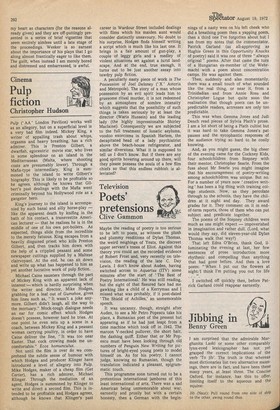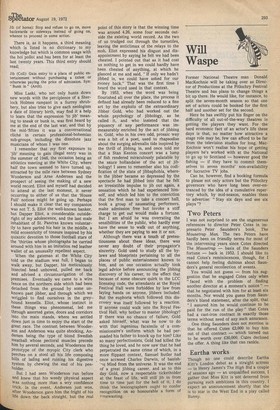Jibbing in
Benny Green
I am surprised that the admirable Marghanita Laski or some other comparably lynx-eyed lexicographer has not yet grasped the correct implications of the verb 'To jib'. The truth is that whereas most dictionaries list two alternative meanings, there are in fact, and have been these many years, at least three. The Concise Oxford, for instance, has this to offer, limiting itself to the aqueous and the equine:
Jib (Naut): Pull round from one side of shiP to the other, swing round thus. Jib (of horse): Stop and refuse to go on, move backwards or sideways instead of going on, whence to proceed in some action.
There is, as it happens, a third meaning which is listed in no dictionary to my knowledge but which is common usage with the hoi polloi and has been for at least the last twenty years. This third entry should read; Jib (Coll): Gain entry to a place of public entertainment without purchasing a ticket or otherwise paying the price of admission. Syn: " Bunk in" (Arch).
Miss Laski, who not only hunts down new words with the percipience of a Sherlock Holmes rampant in a Surrey shrubbery, but also tries to give each neologism a date of literary birth, may find it a help to learn that the expression 'to jib' meaning to sneak or bunk in, was first heard by me at the end of the last war, and that by the mid-'fifties it was a conversational cliche in certain professional-bohemian sub-groups, including the dissolute jazz musicians of whom I was one.
I remember that my first exposure to 'jib' meaning to gain illegal entry was in the summer of 1946, the occasion being an athletics meeting at the White City, where half the town seemed to have turned up, attracted by the mile race between Sydney Wooderson and Arne Andersen and the prospect of seeing the making of a new world record. Eliot and myself had decided to attend at the last moment, it never occurring to either of us that the 'House Full' notices might be going up. Perhaps I should make it clear that my companion was not T. S. Eliot the well-known banker, but Dapper Eliot, a considerable outsideright of my adolescence, and the last male inhabitant of St. Pancras known voluntarily to have parted his hair in the middle, a mild eccentricity of tonsure inspired by his quixotic devotion to those football stars of the 'thirties whose photographs he carried around with him in an imitation red leather wallet of an unusually repellent aspect.
When the gateman at the White City told us the stadium was full, I began to walk away, but Dapper, his meticulously bisected head unbowed, pulled me back and advised a circumnavigation of the premises. Eventually we came to a wire fence on the northern side which had been detached from the ground by some unknown past jibber, and through which we wriggled to find ourselves in the grey-hound kennells. Eliot, whose instinct in these things was phenomenal, led me through assorted gates, doors and corridors into the main stands, where we settled down just in time to enjoy the start of the great race. The contrast between Wooderson and Anderson was quite shocking, Andersen being the type of blond Swedish meatball whose pectoral muscles precede him by several seconds, and Wooderson the Prototype of the myopic City clerk who Perches on a stool all his life composing bills of lading and ruining his digestive System by chewing the end of his penholder.
But I had seen Wooderson run before and knew that his weedy physical aspect was nothing more than a wry confidence trick. In the event, Andersen just won, after Wooderson gave him the fright of his life down the back straight, but the real point of this story is that the winning time was around 4.26, some four seconds outside the existing world record. As the two of us trudged out through the turnstiles, leaving the anticlimax of the relays to the mob, Eliot expressed his disgust and disappointment by saying he felt we had been cheated. I pointed out that as it had cost us nothing to get in we could hardly have been cheated of anything, at which he glanced at me and said, "If only we hadn't jibbed in, we could have asked for our money back." That was the first time I heard the word used in that context.
By 1953, when the word was being flourished all over the place, the process it defined had already been reduced to a fine art by the exploits of the extraordinary Jibber Gold, who had worked out the whole psychology of jibbology, as he called it, and who insisted that the piquancy of any performance was immeasurably enriched by the act of jibbing in. Gold, who in his own odd, prosaic way was a bit of a poet, used to rhapsodise about the surging adrenalin tide inspired by the thrill of jibbing in, and once told me that a Stan Kenton concert was a lump of fish rendered miraculously palatable by the sauce hollandaise of the act of jibbology! I seem to remember also his codification of the state of jibbaphobia, wherein the jibber became so depressed by the spectacle he had jibbed into that he felt an irresistible impulse to jib out again, a sensation which he had experienced himself, and which led him to the conviction that the first man to take a concert hall, book a group of nauseating performers, make admission free but invoke a stiff charge to get out would make a fortune. But I am afraid he was overrating the sensibilities of the public, who hardly ever have the sense to walk out of anything, whether they are paying to see it or not.
Although there was a touch of pretentiousness about these ideas, there was never any doubt of their propagator's sincerity. Gold used to study all the bylaws and blueprints pertaining to all the places of public entertainment known to him, and on one occasion actually took legal advice before announcing the jibbing discovery of his career, to the effect that because of some obscure quirk in the LCC licensing code, the attendants at the Royal Festival Hall were forbidden by law from laying hands on anyone, jibbers included. But the euphoria which followed this discovery was itself followed by a reaction. If anyone could walk into the Royal Festival Hall, why bother to master jibbology? If there was no chance of failure, Gold asked himself, what was he now to do with that ingenious facsimile of a cornmissionaire's uniform which he had per suaded his father to knock up for him? Like so many perfectionists, Gold had killed the
thing he loved, and he now saw that he had perpetrated the same crime of which, in a more flippant context, Samuel Butler had once accnsed Charles Darwin, of banish-q Mind from the universe. It was the end of a great jibbing career, and as to this day Gold, now a respectable ticketholder at the feast of life, will still jib in from time to time just for the hell of it, I do think the lexicographers ought to confer recognition on so honourable a form of ti rnewasting.

































 Previous page
Previous page